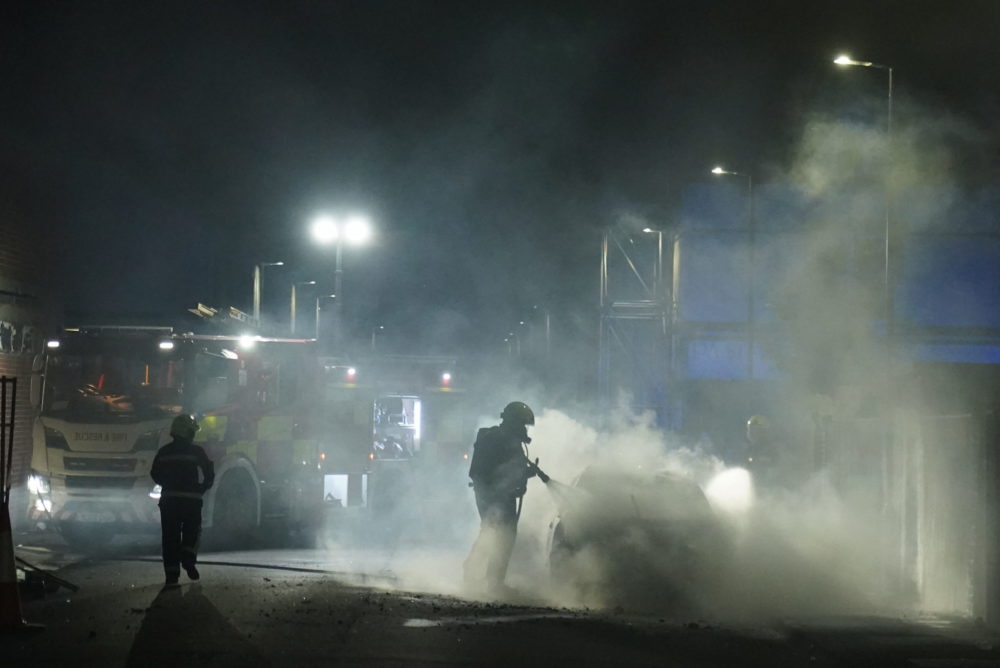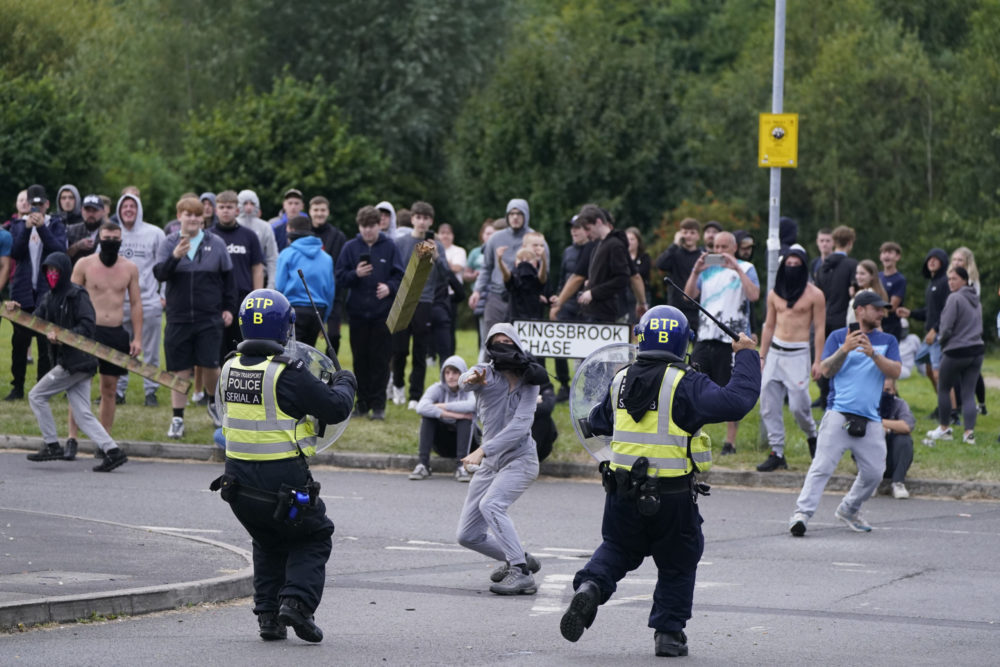Riots: online propagandists know how to work their audiences – this is what we are missing

Richard Fern. Lecturer, media, Swansea University
The frightening scenes of far-right extremists clashing with police and even rioting in British towns and cities in recent days have many wondering how to stop the spread of the propaganda that encourages racism, violence and misogyny.
The tough truth is that in seeking to fact check misinformation and force social media companies to remove hateful content, we are doing it wrong. Another message will simply pop up in place of each that is removed. The people who plant propaganda are far more advanced in their methods than the people trying to stop them. They are not thinking about messages but about audience. Hate is clickbait. And social media algorithms put it on steroids.
The unrest started in Southport where a group who claimed to be “protesting” over the deaths of three young girls during a knife attack in the area attacked a mosque. They seemed to believe that the attack was perpetrated by a migrant (which was untrue). More than 50 police officers were injured when they responded to the emergency.
Misleading
Misleading messages about the Southport attack were posted online and Reform MP Nigel Farage “questioned” whether we were being lied to about the Southport attacker’s identity (although he told the BBC that he had “merely expressed a sense of sadness and concern that is being felt by absolutely everybody I know”).
Our working definitions of propaganda are hopelessly outdated because they all focus on message. And message is unimportant because propagandists will say anything to generate clicks, income or power. They will post calls to “build a wall” and “stop the boats”. They will claim “those kids were murdered in the name of Islam”. Factual accuracy is not important, what matters is that those who wield online influence identify and target a powerbase.
If what they say is taken down, they will simply find a different way to say it to the people they are trying to reach. In the meantime, then they can claim to be censored victims of the establishment. They appeal to emotion rather than rationality, and while their messaging is equal parts ludicrous and disturbing to the rest of us, it wins an audience. Therefore, that audience – rather than the messaging – should be our focus.
‘Imagined communities’
The modern propagandist creates what political scientist Benedict Anderson described as “imagined communities”. He argued that states and nations (and mass media) are founded by successfully creating a community with its own foundation myths, symbols and history. This chimes with the work of propagandist theorist Jacques Ellul, who argued that myths were central and necessary to successful propaganda.
Some symbols are well known and largely shared among us all – spitfires, the British bobby, royalty. But others, like the “cockroach” immigrant, the loss of national agency, and the language of conspiracy theories, are foundational to a community that speaks only to itself. Worse still, those who don’t share their beliefs are naive and need to “do their own research”. Marianna Spring, the BBC disinformation and social media correspondent, found in her book Among the Trolls, algorithmic rabbit holes with their own imagined communities.
Such myths are also fundamental in the process of generating “agitation” propaganda. Traditionally, agitation propaganda is the casus belli summoned by states to send people to war. In the same way, the hatred of today’s racist bigot and the misogyny of the incel are both founded in “agitation” propaganda. Influencer Andrew Tate, for example, has made his name summoning an army of men to fight for his cause.

As Ellul would have it, “hate is generally its most profitable resource … Hatred is probably the most spontaneous and common sentiment, it consists of attributing ones misfortunes and sins to ‘another’… Propaganda of agitation succeeds each time it designates someone as the source of all misery, provided that he is not too powerful.”
Add to this mix social media bots and it brews a poison for our democratic public sphere.
Finding the lost
Fact checking is not useless, but it doesn’t resolve the central problem. Better to identify the silos, and work with their members. We could water down the messaging being sent out to the people causing unrest on the streets with other, better sources. We might even even block some of the networks that deliver the content.
This is better than playing fake news whack-a-mole. Once we have identified the silos of information, we can target the algorithms that create them, and those being targeted or isolated. We can then mediate and ameliorate the problem by reaching out to these groups, spending our energies introducing alternative views, new symbols and foundational myths, negating the effects of algorithm that led them to their silo.
Spring writes of people whose lives have been ruined, of charlatans who create clickbait, but most of all the pathos of those dragged down. Factchecking simply convinces the converted that those who don’t share those views have taken the blue pill of blissful ignorance, rather than the red pill of painful knowledge.
Malicious actors are more than prepared to “flood the zone with shit”, as Trump adviser Steve Bannon puts it. This makes clearing the misinformation impossible, but, by thinking about audience first, we can, maybe, find the lost, and lead them through the storm.
This article was first published on The Conversation
![]()
Support our Nation today
For the price of a cup of coffee a month you can help us create an independent, not-for-profit, national news service for the people of Wales, by the people of Wales.






I tried to share this article on Facebook. They immediately informed me they took it down. They deemed it fishing for likes or something. It’s a very important and instructive read.
http://borthlas.blogspot.com/2024/08/were-not-racist-but.html
‘we can, maybe, find the lost, and lead them through the storm.
Please guide us, oh enlightened media lecturer. The sheer pomposity!
The language is, as you suggest, a tad florid in several places!
But nonetheless I don’t think that the guidance for which you ask is entirely absent. I reckon that the essence of his point is that ‘they are not thinking about messages but about audience. Hate is clickbait.’
It’s a tired old argument that instantly falls apart when you ask the simple question ‘who gets to define hate?’. You’ll have noticed, I’m sure, that this author brings in examples of ‘misinformation’ entirely through the lens of his own political outlook. No mention of any of the BBC’s ‘slip ups’. People are a lot smarter than this guy gives them credit for: personally I do sometimes seek guidance, but I doubt it’ll ever be from a lecturer in Media Studies.
‘who gets to define hate?’.
If you’re genuinely interested ask those inside the hotel that those rioters were trying to burn down.
Were you being smart by not looking at the Manchester Evening News to find out if those who assaulted the police at Manchester airport had been charged.
I just look at the faces whenever the cameras manage to zoom in on this sort of rioter. How do you identify hate?
I’ve guided you to quick and easily accessible reports of people (non white people) who you thought had not been charged by the police for violent assaults.
That would suggest that you are one of the lost.
It seems you prefer being lost.
I find it interesting the way the whole nonsensical “two tier policing” myth has caught on. You know, the one which Musk has been busily pushing. If you throw bricks at policemen and try to set fire to buildings with people trapped inside, of course you are going to be treated with more severity than a peaceful protest is. If a person can’t work that out, they must be exceptionally stupid. It appears Musk is. So, it appears, are many others. It doesn’t seem to matter if this is complete nonsense. Facts and reality don’t even slow such myths down.… Read more »
Yes, it’s a war to win minds. Find the route and send alternative information and lots of it. Not information debunking the normal narrative just new information on the subject and lots of it. We all know people that stroke the fire, like Farage, need to be silenced and really jailed, but taking him and others down ultimately just creates martyrs to the cause. In the end though, if we are to really defeat people who spread hatred and violence we need to build a more equal country. People in a more equal country don’t look for scapegoats to blame… Read more »